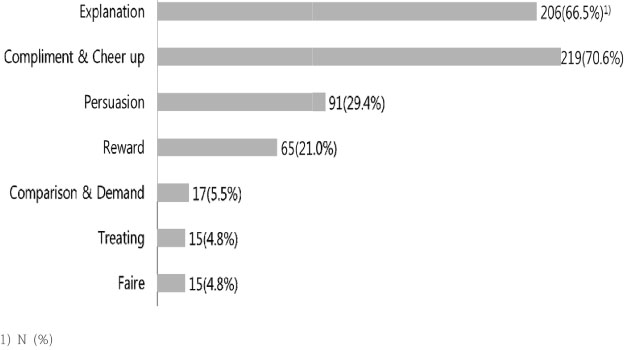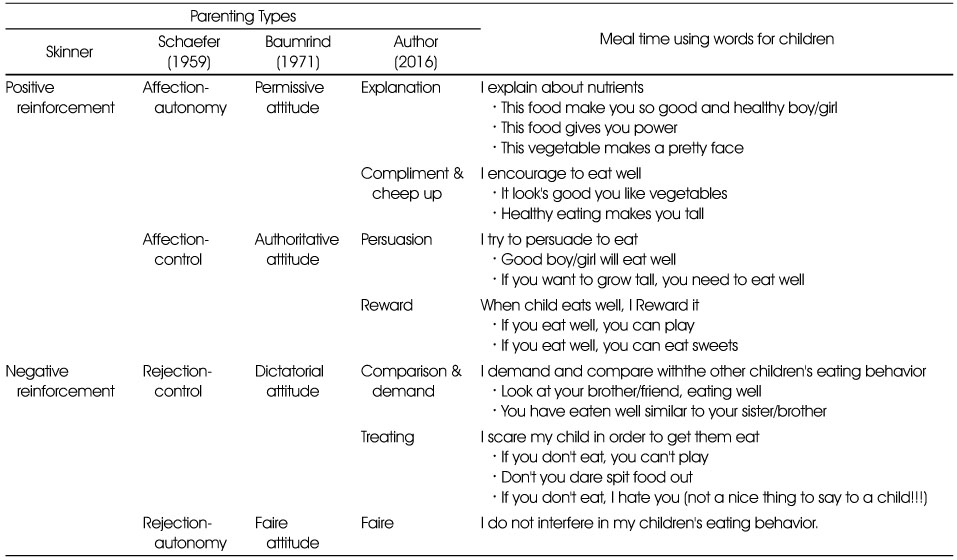Articles
- Page Path
- HOME > Korean J Community Nutr > Volume 22(1); 2017 > Article
-
Research Article
- Mother's Parenting Style at Meal Time and Their Preschooler's Dietary Behavior
-
Soyeon Park, Youngmee Lee

-
Korean Journal of Community Nutrition 2017;22(1):13-21.
DOI: https://doi.org/10.5720/kjcn.2017.22.1.13
Published online: February 28, 2017
1Department of Food and Nutrition,Graduate School of Gachon University, Seongnam, Korea.
2Department of Food and Nutrition, Gachon University Global Campus, Sungnam, Korea.
- Corresponding author: Youngmee Lee. Department of Food and Nutrition, Gachon University Global Campus, Sungnam 13120, Korea. Tel: (031) 750-5971, Fax: (031) 7505971, leeym@gachon.ac.kr
Copyright © 2017 The Korean Society of Community Nutrition
This is an Open-Access article distributed under the terms of the Creative Commons Attribution Non-Commercial License (http://creativecommons.org/licenses/by-nc/3.0/) which permits unrestricted non-commercial use, distribution, and reproduction in any medium, provided the original work is properly cited.
- 1,000 Views
- 7 Download
- 3 Crossref
Figure & Data
REFERENCES
Citations

- Designing Interactive Edutech Content to Improve Young Children’s Eating Habits: Focusing on AR Glasses and IoT Chopsticks
Juhyeon Jeon, Dhahye Shin, Yujin Joung, Yoon Ju Cho
Journal of Digital Contents Society.2025; 26(10): 2905. CrossRef - Association between Picky Eating Behavior, Growth, and Dietary Practices in Preschool Children
Jisun Kim, Sukyoung Kang, Seunghee Kye
Korean Journal of Community Nutrition.2021; 26(1): 1. CrossRef - Study on Recognition and Consumption Behavior of Quality-Certified Children's Preferred Foods of Nursery Directors and Parents in Jecheon Area
Sung Hee Min
Korean Journal of Food & Cookery Science.2017; 33(3): 353. CrossRef

Fig. 1
Mother's parenting style at meal time
General characteristics of the study subjects
Score of nutrition quotient (NQ) of the children
1) Balance Score: 25 (max: 25, min: 3.8)
2) Mean±SD
3) Diversity Score: 20 (max: 20, min: 0)
4) Moderation Score: 10 (max: 10, min: 1.2)
5) Regularity Score: 20 (max: 20, min: 3.0)
6) Practice Score: 25 (max: 25, min: 2.8)
7) NQ Score: 100 (max: 90.7, min: 34.0)
Nutrition quotient (NQ) grade by mother's parenting frequency and message conveyed
1) N (%)
***: p < 0.001
Nutrition quotient(NQ) score by mother's parenting style
1) Balance Score: 25 (max: 25, min: 3.75)
2) Diversity Score: 20 (max: 20, min: 0)
3) Moderation Score: 10 (max: 10, min: 1.21)
4) Regularity Score: 20 (max: 20, min: 2.97)
5) Practice Score: 25 (max: 25, min: 2.75)
6) Mean±SD
*: p < 0.05, **: p < 0.01, ***: p < 0.001
Nutrition quotient(NQ) grade by mother's parenting style
1) N (%)
**: p < 0.01, ***: p < 0.001
1) Balance Score: 25 (max: 25, min: 3.8) 2) Mean±SD 3) Diversity Score: 20 (max: 20, min: 0) 4) Moderation Score: 10 (max: 10, min: 1.2) 5) Regularity Score: 20 (max: 20, min: 3.0) 6) Practice Score: 25 (max: 25, min: 2.8) 7) NQ Score: 100 (max: 90.7, min: 34.0)
1) N (%) ***: p < 0.001
1) Balance Score: 25 (max: 25, min: 3.75) 2) Diversity Score: 20 (max: 20, min: 0) 3) Moderation Score: 10 (max: 10, min: 1.21) 4) Regularity Score: 20 (max: 20, min: 2.97) 5) Practice Score: 25 (max: 25, min: 2.75) 6) Mean±SD *: p < 0.05, **: p < 0.01, ***: p < 0.001
1) N (%) **: p < 0.01, ***: p < 0.001

 KSCN
KSCN







 Cite
Cite


